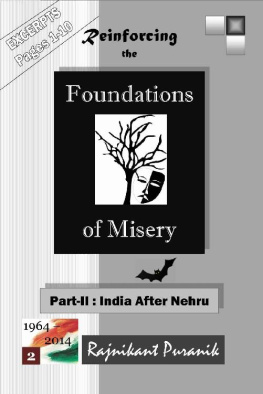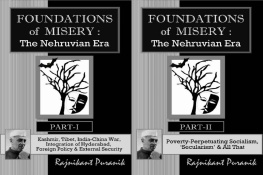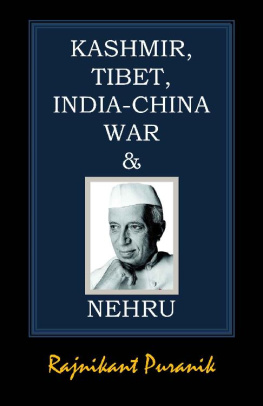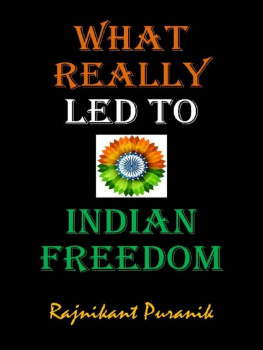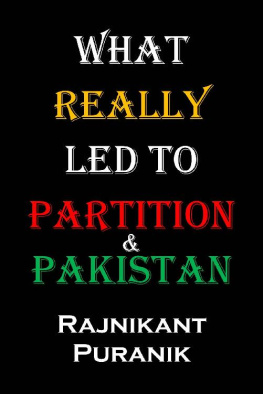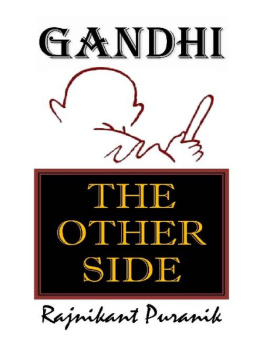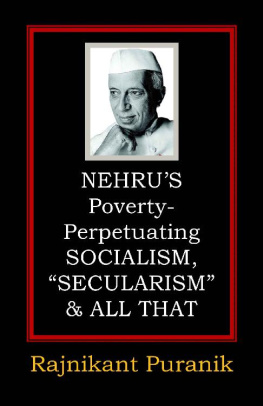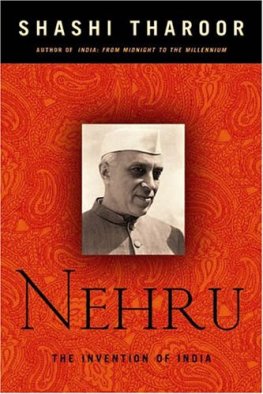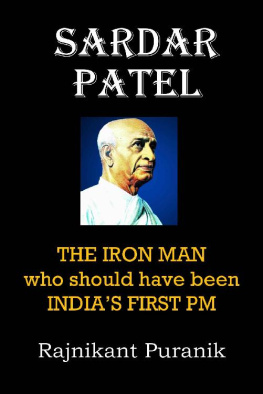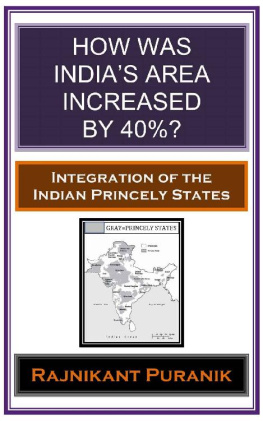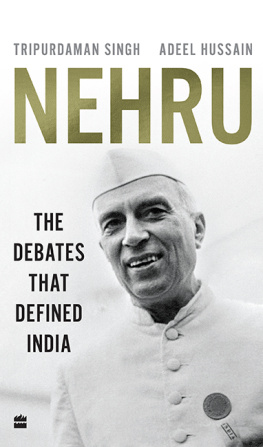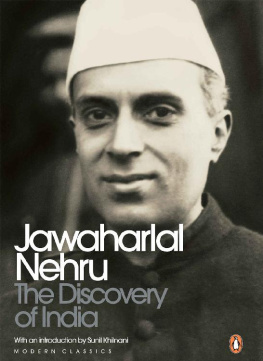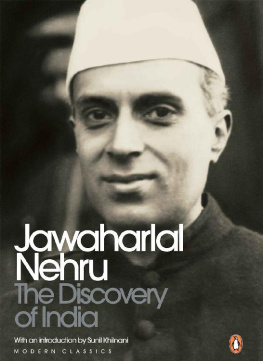Rajnikant Puranik - Reinforcing the Foundations of Misery: Part-II : India After Nehru
Here you can read online Rajnikant Puranik - Reinforcing the Foundations of Misery: Part-II : India After Nehru full text of the book (entire story) in english for free. Download pdf and epub, get meaning, cover and reviews about this ebook. year: 2014, genre: Politics. Description of the work, (preface) as well as reviews are available. Best literature library LitArk.com created for fans of good reading and offers a wide selection of genres:
Romance novel
Science fiction
Adventure
Detective
Science
History
Home and family
Prose
Art
Politics
Computer
Non-fiction
Religion
Business
Children
Humor
Choose a favorite category and find really read worthwhile books. Enjoy immersion in the world of imagination, feel the emotions of the characters or learn something new for yourself, make an fascinating discovery.
- Book:Reinforcing the Foundations of Misery: Part-II : India After Nehru
- Author:
- Genre:
- Year:2014
- Rating:5 / 5
- Favourites:Add to favourites
- Your mark:
- 100
- 1
- 2
- 3
- 4
- 5
Reinforcing the Foundations of Misery: Part-II : India After Nehru: summary, description and annotation
We offer to read an annotation, description, summary or preface (depends on what the author of the book "Reinforcing the Foundations of Misery: Part-II : India After Nehru" wrote himself). If you haven't found the necessary information about the book — write in the comments, we will try to find it.
Rajnikant Puranik: author's other books
Who wrote Reinforcing the Foundations of Misery: Part-II : India After Nehru? Find out the surname, the name of the author of the book and a list of all author's works by series.
Reinforcing the Foundations of Misery: Part-II : India After Nehru — read online for free the complete book (whole text) full work
Below is the text of the book, divided by pages. System saving the place of the last page read, allows you to conveniently read the book "Reinforcing the Foundations of Misery: Part-II : India After Nehru" online for free, without having to search again every time where you left off. Put a bookmark, and you can go to the page where you finished reading at any time.
Font size:
Interval:
Bookmark:
Reinforcing
the
Foundations of Misery
__________________________
Rajnikant Puranik
__________________________
Excerpts on Page-1
Kindle Digital Edition
www.amazon.com
Paperback Edition
USA, Europe
www.amazon.com
www.createspace.com
India
www.pothi.com
www.rkpbooks.com
www.facebook.com/fom.p1
Loyalty to countryALWAYS.
Loyalty to government, when it deserves it.
Mark Twain
The duty of apatriot is to protect his country from its government.
Thomas Paine
Patriotism means to stand bythe country. It does not mean to stand by the president or any other publicofficial, save exactly to the degree in which he himself stands by the country.It is patriotic to support him insofar as he efficiently serves the country. Itis unpatriotic not to oppose him to the exact extent that by inefficiency orotherwise he fails in his duty to stand by the country. In either event, it isunpatriotic not to tell the truth, whether about the president or anyone else.
TheodoreRoosevelt
To cure theBritish disease with socialism
was like trying to cure leukaemia with leeches.
Margaret Thatcher
Socialism ingeneral has a record of failure so blatant
that only an intellectual could ignore or evade it.
Thomas Sowell
To the fond memory of my late parents
Shrimati Shakuntalaand
Shri LaxminarayanPuranik
Allrights reserved. No part of this publication may be reproduced, distributed ortransmitted in any form or by any means, whether electronic/digital or print ormechanical/physical, or stored in an information storage or retrieval system,without the prior written permission of the copyright owner, that is, theauthor, except as permitted by law. However, extracts up to a total of 1,000words may be quoted without seeking any permission, but with dueacknowledgement of the source. For permission, please write to rkpuranik@gmail.com.
Reinforcing the
Foundations of Misery
Part-II : India After Nehru
Rajnikant Puranik
Categories: Non-fiction,History
First Edition, Ver.1.0
April 2014
ISBN-13:978-81-928101-5-7
Copyright 2014Rajnikant Puranik
rkpuranik@gmail.com
www.rkpbooks.com
www.facebook.com/fom.p1
Cover Design, BookDesign & Layout: Rajnikant Puranik
Kindle DigitalEdition
www.amazon.com
Paperback Edition
USA, Europe
www.amazon.com, www.createspace.com
India
www.pothi.com
Contents
Foundations of Misery, Part-I: India, 1947-64published on 2 October 2013 was the first part of this two-volume series.Part-I dealt with the Nehruvian era. Unfortunately for the millions of Indians,particularly its poor, Nehru, despite his best intentions, ended up as anall-round comprehensive failure. We had synopsized those failures in the lastchapter of Part-I Summarising the Invention.
Nehru unwittingly laid the foundations of Indias misery.Sadly, his dynasty reinforced those blighted foundations. This part covers thatpost-Nehru period of calamitous reinforcement. Not comprehensively, butselectivelypicking up only those aspects considered critical if India has torise from the depths to which it has been consigned. Consciously avoidingverbosity and many details, the coverage is deliberately as brief as possible,to make the book more readable.
One aspect of the Nehruvian era that was left out in Part-Iis covered in this part in the chapter Mental Slavery. Thats because theconcerned aspect spans across both the periods.
This book was first published in April 2014, well before thedeclaration of the results of the exit-polls on 12 May 2014 and the actualresults of the Lok Sabha (Parliament) elections on 16 May 2014.
Starting from the post-Nehru period of Lal Bahadur Shastri,this book covers the period of Indira Gandhi, Morarji Desai, Rajiv Gandhi,Narsimha Rao, Vajpayee and others; the last decade of Sonia-Rahul-ManmohanSingh; and the current relevant aspects related to the Dynasty, Narendra Modi,BJP, and AAP; and has required no changes to its initial contents of April 2014consequent to the election resultsthough there have been some additions onaccount of Priyankas Neech Rajniti remarks in May 2014 during theelection campaign.
We all Indian citizens hope Modi would usher a new era thatwould help India emerge from its misery and propel it forward into the ranks ofthe prosperous first-worldwhere India would have been by 1980 itself hadproper policies been followed.
What is THE critical factor for assessing a country or apolitical party? Its economic philosophy, its economic vision and its economicpolicies.
~~~
Are one or more of these the factors that make a country pooror prosperous: climate, geography, location, abundance of natural resources,race, history, type of people, character of people?
NO. None of these.
What matters is the economic system chosen. All thosecountries, irrespective of these factors (climate, geography, race,character, ...), who adopted competitive capitalism have prosperedand are part of the first-world, like the US, Canada, the UK, West Europe,Japan, Taiwan, South Korea, Singapore, Australia, New Zealand. China prosperedpost-Mao after it junked Maoism and adopted a form of Free EnterpriseEconomy. It is worth noting that not a single socialist or communistcountry has ever prospered.
Raja Vyapari tayaPraja Bhikhari.
Indian Proverb
- -
Mr Jawaharlal Nehru returned from Cambridge with notionsof how an all-governing interventionist state can force people into happinessand prosperity through socialism...He sticks to this bias in spite of thedemonstration of world experience against it...I hate the present folly andarrogance as much as I hated the foreign arrogance of those [British] days.
C Rajagopalachari (Rajaji)
- -
Sardar Patel, Rajagopalachari and Rajendra Prasad wereopposed to socialism. If only they had led India after Independence, ratherthan Nehru, India would have been a prosperous first-world country long ago,and it would hopefully have been saved from the debilitating feudal Dynasticdemocracy, that is at the root of all miseries.
~~~
It was the mercantile-industrial capitalism that led todemocracy. Democracy did not evolve out of monarchy, oligarchy, feudalism,socialism or communism. The latter have only curbed freedom. CompetitiveCapitalism/Free Enterprise Economy and democracy go together.
- -
Its not as if there is a menu of systems, and one can choosewhich to adoptsocialism or communism or their different flavours, Gandhiism,capitalism, and so on.
Free enterprise and capitalism were not something that werefirst theorised, then planned, and then implemented or rammed down. Theyevolved as a sequence of civilisational growth, were taken cognizance of, andthen theorised after the fact. Facts and practice led to the theory, and thenthe theory enhanced the practice. Thereafter, it was a beneficial evolvingcycle, each helping enhance the other. Democracy, in turn, evolved out of freeenterprise and capitalism; and again there was a cyclical effect between thetwo, each helping enhance the other.
In comparison, there is nothing natural, organic orevolutionary about Socialism, Communism or Gandhiism. They are all highlydeficient artificial constructs incapable of practical success because thehuman civilisational evolution is just too complex, and there are far too manyvariables and too many unknowns for any artificial construct to contend with.
~~~
The term Hindu rate of growth is highly inappropriate andunfair, besides being derogatory. Post-independence low rate of growth wasthanks to Nehru-Indira-Rajivs policies. It should rather be called the
Font size:
Interval:
Bookmark:
Similar books «Reinforcing the Foundations of Misery: Part-II : India After Nehru»
Look at similar books to Reinforcing the Foundations of Misery: Part-II : India After Nehru. We have selected literature similar in name and meaning in the hope of providing readers with more options to find new, interesting, not yet read works.
Discussion, reviews of the book Reinforcing the Foundations of Misery: Part-II : India After Nehru and just readers' own opinions. Leave your comments, write what you think about the work, its meaning or the main characters. Specify what exactly you liked and what you didn't like, and why you think so.

